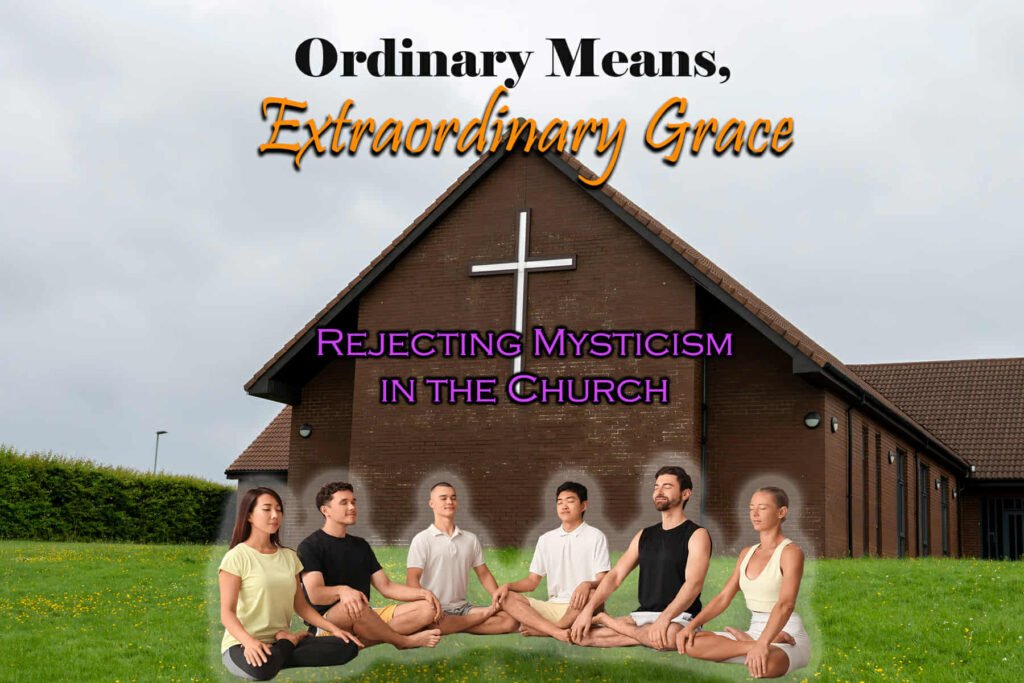⏱️ Estimated Reading Time: 10 min read
The Dangers of Contemplative Spirituality
By Gary Gilley
Fall 2025 | Theology for Life
I recently received an email from an individual (some details edited for the sake of privacy), which lays out the concerns and confusion many church members face as they encounter Contemplative Spirituality, often termed “spiritual formation”. Part of the confusion has to do with terminology. Who could possibly struggle with the idea of spiritual formation, if by that we mean discipleship and growing in Christ? But as we will see in this short article, that is not what is being expressed by those actually advocating Contemplative Spirituality. Below is the essence of this individual’s concerns:
Dear Pastor Gilley,
I purchased your book Out of Formation this week after hearing you on a podcast where you were interviewed regarding the Spiritual Formation Movement. I knew nothing of this movement until I was referred to you last week by someone at the new church we started attending two weeks ago.
The newly appointed pastor at our old church announced to the congregation, several weeks after he was declared our new pastor that he had been accused of some matters of orthodoxy centered around spiritual formation. (This church we’d been attending for many years was a non-denominational, conservative, evangelical church.) He said he was being accused of straying from Bible-centered teaching, orthodoxy and orthopraxy. He went on to say that he was enrolled in a Doctor of Theology program entitled “Spiritual Formation and Relational Neuroscience” at a well-known evangelical seminary. I’d not heard of the Spiritual Formation Movement, and didn’t think anything about it. However, people that did know about it started leaving the church, and eventually we joined them.
At the church we have started to attend we discovered that many of the church members are greatly concerned about the matter of the Spiritual Formation issue. Knowing nothing about the movement, I was referred to you by one of the leaders in the church.
I received your book on Wednesday of this week, and finished it today, Saturday of the same week. (Amazing for me.) I just wanted to thank you SO VERY MUCH for writing this book! I loved how you so very thoroughly explained the Spiritual Formation Movement and its roots. I had no idea, as I’m sure many of our former church members don’t. Oh, how Satan loves to mix truth and error. I also loved that in Part 2 of the book you detailed the biblical disciplines complete with Scripture references. Love, love, love that part of the book. Thank you for including it.
This email reflects the misperceptions and lack of understanding that many Christians have of “spiritual formation” and Contemplative Spirituality. Because this approach goes by various names and makes attractive claims regarding its importance in the Christian life, many buy into its teachings concerning spirituality without a true understanding of what is being promoted and how much it veers from biblical Christianity. In response to the author of this email, and many like him, this article will give a thumbnail sketch of the roots, modern-day promoters, and fundamental teachings of “spiritual formation” and Contemplative Spirituality.
Roots
Perhaps one of the most important factors in analyzing “spiritual formation” is its source or origin. Its teachers are fond of stating that their disciplines have old roots, going back to the earliest days of the Church. By speaking in this manner, “spiritual formation” adherents often disguise the fact that they are not tracing their theology and ideas concerning spirituality back to the Scriptures, but to those who lived decades and sometimes centuries after the canon was closed.
While they often link their ideas with Scripture, use biblical terminology, and claim the spiritual high ground, they are not drawing most of their teachings from the Word of God. Instead, they embrace those they often call “spiritual masters”, who supposedly discovered spiritual insights through various mystical experiences rather than the revelation found in the Scriptures. This is the fatal flaw in the whole movement.
The early Church (post-apostolic, not the first century New Testament Church) did many things right and many things wrong. Its pronouncements, views, rituals, organizations, and structures can be examined with profit, but they were not without errors. In fact, the Church during the “classical stage” (2nd through 6th centuries) often moved both doctrinally and ecclesiastically away from the inspired Word of God and established its own views, doctrines, philosophies, rituals, and formats. In addition, it accepted and developed a preference for allegorical interpretation of Scripture.
A good example of what emerged from this type of hermeneutic is the monastic movement in which the “Desert Fathers and Mothers” migrated to the Egyptian wilderness to live as hermits and supposedly contemplate God. In misguided zeal and without direction from Scripture, these men and women would often starve themselves, expose their bodies to the elements, go as long as possible without sleep, and live isolated from civilization. Under these peculiar and extreme conditions, many of them claimed to have visions and encounters with the Lord that normal Christians did not have.
As a result, some declared these individuals to be super-saints and their visions and dreams as revelatory words from the Lord. They were elevated to the status of Christian celebrities. These are the very ones that modern proponents of Contemplative Spirituality call “spiritual masters” and from whom they draw their understanding of “spiritual formation”. The teachings, methods, and concepts behind the Spiritual Formation Movement are drawn from these early contemplative hermits, as well as medieval monks and nuns, principally from the Counter-Reformation period, and not from Scripture.
It is essential to get this connection. Many, if not most, of the disciplines and instructions found within “spiritual formation” are not drawn from Scripture; they are drawn from the imaginations of men and women passed along through tradition.
Bruce Demarest, a promoter of Contemplative Spirituality, tells his readers that for help in “spiritual formation”, we are to “turn to our Christian past—to men and women who understood how the soul finds satisfaction as we grow in God, and how His Spirit finds a more ready home in us.” And just who are these people to whom we are supposed to turn? Demarest suggests John of the Cross, Henri Nouwen, Francis of Assisi, Teresa of Avila, the Desert Fathers and Mothers, and the Christian mystics. Other highly touted mystics include Thomas Keating, Thomas Merton, Francis De Sales, Thomas Kelly, Madame Guyon, Theophan the Recluse, Ignatius of Loyola, Meister Eckhart, and Julian of Norwich.
Virtually every author who has written a book on “spiritual formation” draws his or her understanding of the Christian life and Christian experience from this stable of mystics. In other words, “spiritual formation” is not founded on the New Testament Scriptures and examples, but mostly on the experiences of Roman Catholic mystics, with a few Eastern Orthodox and Quakers thrown into the mix. It is important to understand that the Spiritual Formation Movement is not based on Scripture but on the experiences, writings, and claims of those who teach a false gospel and misunderstand the Christian life as detailed in God’s Word.
Modern-day Promoters
The source of the modern interest in Contemplative Spirituality can be traced to 1974, when Father William Menninger, a Trappist monk, found an ancient book entitled The Cloud of Unknowing in the library at St. Joseph’s Abbey in Spencer, Massachusetts. This 14th century book offered a means by which contemplative practices, long used by Catholic monks, could be taught to lay people. Menninger, Thomas Keating, and Basil Pennington, all Roman Catholic monks, began teaching these methods within Catholic circles. Their concepts and patterns leaped into Protestant evangelicalism through the writings of Richard Foster, initially with the publication of his 1978 book, Celebration of Discipline.
These disciplines were not completely unknown to evangelicals familiar with Church history, but they were now being repackaged and offered as a means of spiritual growth and maturity. The implication was that without the use of these ancient contemplative methods true “spiritual formation” was not possible.
Long accepted biblical disciplines, such as Bible study and prayer, were framed as quaint and simplistic. Worse, believers were told that these biblical disciplines were forged from a Western “worldview of the head” apart from the heart. If the believer wanted to move deeply into the things of God, such practices were not enough, for they never really reached the heart.
Richard Foster, an evangelical Quaker, relied much on the teachings of his mentor Dallas Willard. Willard’s books, such as The Divine Conspiracy, The Spirit of the Disciplines, and Hearing God, had profound impact not only on Foster but on early framers of the Spiritual Formation Movement. Foster wrote in 2004 that “Seminary courses in Spiritual Formation proliferate like baby rabbits” and that thousands were seeking spiritual directors.
Prominent leaders besides Foster and Willard include John Ortberg, Bruce Demarest, Ruth Haley Barton, Ken Boa, Joan Chittister, Robert Webber, Dan Allender, Phyllis Tickle, Robert Benson, Scot McKnight, Nora Gallagher, Adele Calhoun, David deSilva, Jan Johnson, Leighton Ford, Larry Crabb, Calvin Miller, Tricia McCary Rhodes, Mindy Caliguire, Albert Haase, Eugene Peterson, M. Robert Mulholland Jr., Gordon Smith, Brian McLaren, Mark Yaconelli, Brennan Manning, and Henri Nouwen. More recently, John Mark Comer has attempted to update the movement for a new generation.
Fundamental Teachings: Spiritual Disciplines
At the heart of Contemplative Spirituality are the so-called “spiritual disciplines”. John Ortberg describes these as “any activity that can help me gain power to live life as Jesus taught and modeled it.” How many are there? “As many as we can think of.” Comer agrees.
Is this the case? Can virtually any activity be turned into a biblical spiritual discipline? Does God sanction all sorts of random practices as means of progressive sanctification? Biblical disciplines are indispensable for spiritual growth and discipleship. Man-made disciplines are, at best, optional and are certainly not essential, or else God’s Word would have commanded them and provided instruction for their use.
The Bible clearly speaks of the discipline of studying Scripture (John 17:17; Psalm 1; Psalm 19; 2 Timothy 3:15–4:6) and of prayer as a source of spiritual development (Hebrews 4:15–16). The need for the body of Christ in teaching, encouragement, and ministry is also clear (Ephesians 4:11–16; Hebrews 10:24–25). When we stray much beyond these, we run into trouble.
Nevertheless, the Spiritual Formation Movement offers long lists of “classical disciplines.” Foster includes meditation, contemplative prayer, fasting, study, simplicity, solitude, submission, service, confession, worship, guidance, and celebration. IVP’s Formatio line and other publishers expand the list with sacramental life, silence, journaling, spiritual mentoring, pilgrimage, Sabbath keeping, lectio divina, and spiritual direction. The Thomas Nelson “Ancient Practices” series and other lines reinforce the same trajectory.
This leads to a fork in the road. Do we, as believers in sola Scriptura, take our marching orders from the written Word, or do we look to the “white spaces” in Scripture to determine how we live? Do we actually believe that the Lord has given us in Scripture the teachings and practices He wants us to follow, or do we believe that we must supplement the authentic words of God with our imagination and traditions of men?
Once it is accepted that we can “enhance” the Christian life by augmenting the inspired words of Scripture, there is no limit to where we might end up. And so, my friend, I encourage you to turn to Scripture alone for your source of spiritual growth and discipleship. Contemplative Spirituality is a side road that, if taken, will cause you to wander from biblical Christianity.
This article appears in the Fall 2025 Issue of Theology for Life Magazine, exploring “The Means of Grace.”

Ordinary Means, Extraordinary Grace: Rejecting Mysticism in the Church
Dr. Gary E. Gilley has been pastoring at Southern View Chapel in Springfield, Illinois since 1975.




